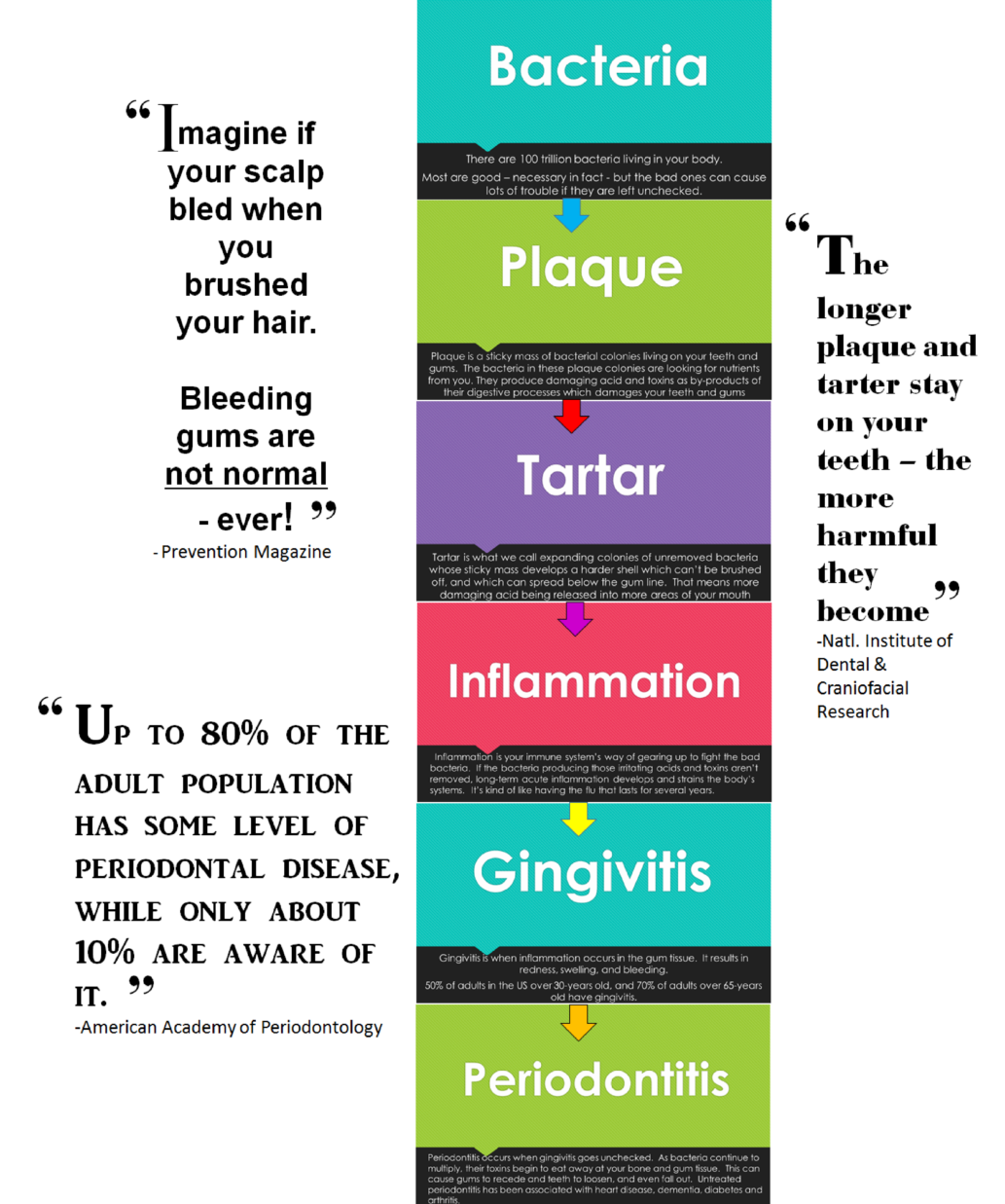


Tooth Truths: Many, people bleed every time they brush or floss their teeth and think nothing of it – considering it to be just a minor, relatively inconsequential annoyance. Certainly nothing to be concerned about. Perhaps you’re one of those people. And, if you are, we’d like to ask you a question.
Is a Bleeding Eye Normal? Would you be concerned if your eyelid bled when you rubbed your eye? Would you be concerned if your scalp bled when you brushed your hair? Would you think that’s just a normal thing – something to just blot with a tissue, and continue on with your day? Not likely.
Inconvenient Facts: Spontaneous bleeding that results from minor physical contact is never normal, regardless of where it occurs in your body. Bleeding gums are never normal, never – not even when you have your teeth professionally cleaned in a dentist’s office. Bleeding is a symptom. It’s the sign of a problem. That problem is called gum disease – which is a generic term that includes several stages of severity, from inflammation to gingivitis to periodontitis.
And here’s the astounding part. Somewhere between 50% – 70% of adults in the U.S. (depending on their age group) are afflicted with this condition – many of them completely unaware that they have this disease. That means they are also likely unaware of what gum disease actually is, how it progresses, and what it can lead to.
So what exactly is defined as gum disease? Simply put, gum disease is a contagious bacterial infection that can wreak havoc on your health. At its most severe level, it can destroy your gums, erode your jawbone, and is the number one reason that teeth fall out. It’s caused, primarily, by bacterial plaque, a sticky film comprised of bacteria and their waste products, acids and enzymes, which begins to irritate the gum tissue in proximity to it.
Follow the Bloody Brick Road: The road to gum disease does not lead to the sparkling emerald city of OZ. Here’s where it does lead. The irritation to your gums, that’s caused by the bacterial acids and enzymes, causes your body’s immune system to react to the wounding of your gum tissue by triggering an inflammatory response. That response presents itself as sensitivity, swelling, and bleeding. At that initial stage, what you have is called gingivitis.
The Long Term Consequences Are Horrific: If left unchecked, the inflammation of gingivitis becomes acute, progressing to what’s called periodontitis – the most severe level of gum disease. If unaddressed, periodontitis begins to eat away at bone and gum tissue. That, in turn, advances the symptoms from swelling and bleeding to now include receding gums and loosened teeth. Long term, uncontrolled periodontitis has been linked to a whole host of even more serious, systemic diseases – things like heart disease, dementia, and diabetes, and a whole host of others.
Sometimes the Warning Signs Are Delayed:
Finally, you should know that sometimes the warning signs for gum disease, like bleeding gums, don’t show up until the middle to late stages of the disease’s advancement.
That’s why we explore for other signs that these disease producing bacteria are present in your mouth – by using gas chromatography breath analysis and oral DNA testing.
5 REALLY SCARY REASONS TO TAKE GUM DISEASE SERIOUSLY:
#1. It can damage your heart
People with gum disease are almost twice as likely to suffer from coronary artery disease compared to those don’t have periodontitis. Researchers aren’t exactly sure of why this might be, but one theory is that harmful bacteria from your mouth enters your blood stream and attaches to fatty plaques in your heart’s blood vessels, leading to inflammation and upping your risk of clots that can trigger heart attacks.
#2. Your memory could suffer
Some research suggests there may be a tie between poor oral health and an increased risk of dementia. One study that followed 118 nuns between the ages of 75 and 98 found that those with the fewest teeth were most likely to suffer dementia. Experts think oral bacteria may spread to the brain through cranial nerves that connect to the jaw or through the bloodstream, and may contribute to the type of plaque that’s been linked to Alzheimer’s.
#3. It can hurt your blood sugar levels
People with diabetes are more likely to have periodontal disease than those without diabetes. While this may be because diabetics are more susceptible to infections, there’s also been research that finds gum disease could make it harder to control your blood sugar, and that treating it helps improve diabetes symptoms.
#4. It may affect your breathing
Gum disease may increase your risk of getting respiratory infections, such as chronic obstructive pulmonary disease (COPD) and pneumonia, according to the Journal of Periodontology. The infections might be caused when bacteria from the mouth are inhaled into your lungs, possibly causing your airways to become inflamed.
#5. It could hurt your fertility
Women of childbearing age with gum disease took an average of just over seven months to become pregnant—two months longer than the average of five months that it took women without gum disease to conceive, discovered researchers in Western Australia. Other research finds that pregnant women with gum disease might have higher odds of miscarriage.

